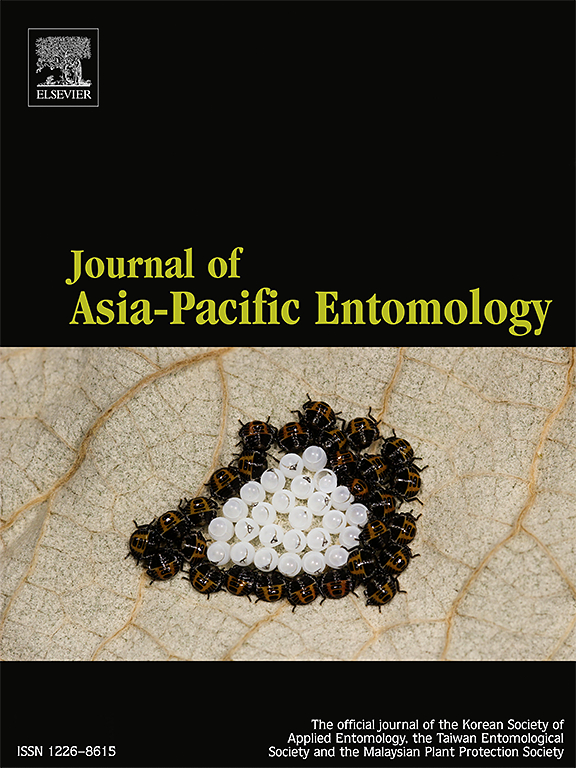茶籽皂苷对桑鼻蛾的杀虫性能研究
IF 1.3
3区 农林科学
Q3 ENTOMOLOGY
引用次数: 0
摘要
桑树鼻蛾(Glyphodes pyloalis Walker)是亚洲桑树的重要危害害虫。由于其对桑叶危害广泛,对桑蚕养殖造成障碍,因此合成和生物杀虫剂的应用是不可避免的。过量使用杀虫剂可能导致抗药性,污染环境,主要是水资源,因此使用天然产品(如植物性杀虫剂)作为替代方法非常重要。本研究从茶叶种子中提取一种皂素,并对其进行防治幽门螺杆菌幼虫的研究。结果表明,浓度为2.8%的皂苷处理的幼虫死亡率为对照组的50%,LT50(中位致死时间)为6.34 d。驱避指数呈剂量依赖性增加。与对照组相比,茶皂素处理增加了卵孵化期、幼虫期和蛹期。暴露后幼虫的消化碳水化合物和蛋白酶活性显著降低。此外,皂素处理显著降低了幽门螺杆菌幼虫的消化酶活性,但对抗氧化系统有显著的促进作用。结果表明,茶皂素可影响幽门螺杆菌的重要生理和生物学过程,可作为一种有效的生物农药防治幽门螺杆菌。本文章由计算机程序翻译,如有差异,请以英文原文为准。

Insecticidal properties of tea seed saponin against the mulberry snout moth, Glyphodes pyloalis Walker (Lepidoptera: Crambidae)
The mulberry snout moth, Glyphodes pyloalis Walker, is an important and destructive pest of mulberry in Asia. Because of its extensive damages on mulberry leaves and making obstacle in sericulture, it is inevitable application of synthetic and biorational insecticides. Excessive application of insecticides may lead to develop resistance and to pollute environment mainly water resources therefore use of natural products (like botanical insecticides) is of great importance as an alternative. In the present study, a saponin was extracted from tea seeds and treated against G. pyloalis larvae. Results showed that a concentration of 2.8 % saponin caused 50 % mortality in treated larvae compared to the control, and the LT50 (Median Lethal Time) was 6.34 days. Also, the repellency index increased in a dose-dependent manner. Tea saponin treatment increased the duration of egg hatching, larval and pre-pupae periods compared to the control. Activities of digestive carbohydrates and proteases were significantly reduced in the exposed larvae. Additionally, saponin treatment significantly decreased the activity of digestive enzymes but it statistically induced antioxidant system in G. pyloalis larvae. The obtained results suggested that tea saponin can affect important biological and physiological processes of G. pyloalis and it may be used as an efficient biopesticide in control of G. pyloalis population.
求助全文
通过发布文献求助,成功后即可免费获取论文全文。
去求助
来源期刊

Journal of Asia-pacific Entomology
Agricultural and Biological Sciences-Insect Science
CiteScore
2.70
自引率
6.70%
发文量
152
审稿时长
69 days
期刊介绍:
The journal publishes original research papers, review articles and short communications in the basic and applied area concerning insects, mites or other arthropods and nematodes of economic importance in agriculture, forestry, industry, human and animal health, and natural resource and environment management, and is the official journal of the Korean Society of Applied Entomology and the Taiwan Entomological Society.
 求助内容:
求助内容: 应助结果提醒方式:
应助结果提醒方式:


